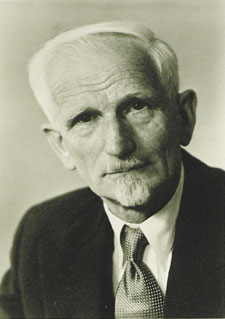Matthias Simon: Religious Socialism
Unlike the large majority of pastors with national conservative views, Matthias Simon (1893–1972) belonged to the tiny minority of religious socialists and was probably the sole Bavarian pastor to join the SPD.
A veteran of World War I and a Freikorps fighter in the period of revolution and the soviet in Munich, Simon had been a pastor in Arzberg since 1925. After having denounced the shortcomings of the church and middle class during the period of his vicarage, he witnessed the social plight of workers firsthand in Arzberg and began making a name for himself politically.
An article in which Simon supported the referendum on the expropriation of princes in June of 1926 especially caused a great stir. While the supreme body of the Protestant churches – the German Evangelical Church Committee – opposed the referendum because expropriating the princes would be inconsistent with the tenets of the Gospel, Simon signaled solidarity with the workers with his article: Although they had fought in the war for Germany, they now had to suffer poverty, while the princes retained their property.
Having refrained from partisan political until then, Simon joined the SPD that same year and also made a public statement against the Nazis. He protested in his parish newsletter against the consecration of Julius Streicher’s (1885-1946) standards in the Church of St. Lawrence in Nuremberg. Simon considered the NSDAP to be a destructive combat organization. He called the consecration of flags an unbelievable impropriety, which was tantamount to a declaration of war on all parishioners who thought differently (T. Kluck, Simon, p. 51f.).
After raising the ire of the church leadership and the pastoral conference against himself with his article on the expropriation of princes, Simon was also attacked by the Nazi press for expressing his opinion against the consecration of flags. When he intended to defend his point of view at a public meeting he summoned in September of 1926, a counter-meeting was held at the same time. The attendees resolved to no longer recognize him as a pastor and to call upon the government to take action.
The Munich church government under Church President Friedrich Veit (1861-1948), which had received numerous complaints about Simon, treated him moderately and merely issued a warning that he should restrain himself politically in the future. Simon followed these instructions at first and did not become politically active until 1930 when large numbers of his fellow Bavarian pastors agitated for the NSDAP. He made appearances at SPD meetings in the run-up to the Reichstag elections in September of 1930.
He also took a clear stand against National Socialism at the conference of the Home Mission Association in Neuendettelsau in July of 1931, the main theme of which was National Socialism and the Protestant Church. The audience members, most of whom held Nazi views, were outraged at Simon’s remarks, as were the pro-Nazi speakers. One of them was the teacher, leader of the NSDAP’s Untergau of Upper Franconia and later Bavarian Minister Education and Cultural Affairs Hans Schemm (1891-1935) who had delivered a fiery speech against Bolshevism.
One year later, Simon started a job as religion teacher at a high school in Nuremberg. In 1935, staff at the then-Nazi Ministry of Education and Cultural Affairs recalled his earlier membership in the SPD and his disapproval of the NSDAP.
Ernst Boepple (1887-1950), who had headed the Ministry of Education and Cultural Affairs since Schemm’s death in March of 1935, wanted to get the regional consistory to dismiss Simon from teaching and return him to pastoral ministry. Although Simon, who wanted to remain in the teaching profession, attempted to convince the ministry his views had changed, he returned to pastoral ministry in 1936.
Thereafter, Simon restrained himself politically. After World War II, together with regional SPD chairman Waldemar von Knoeringen (1906-1971), he started the discussion group “Church and SPD” at the suggestion of the regional consistory. He became famous primarily for his valuable work in church history and as the director of the Nuremberg regional church archives of the Evangelical Lutheran Church in Bavaria.
Source / title
- © Landeskirchliches Archiv Nürnberg, Bildersammlung Personen Simon, Matthias P6_001

